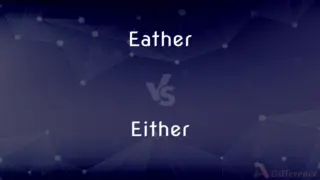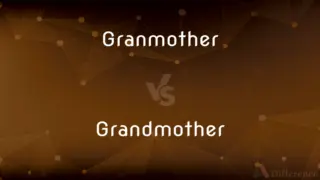Distrub vs. Disturb — Which is Correct Spelling?
By Tayyaba Rehman — Updated on March 26, 2024
"Distrub" is an incorrect spelling, while "Disturb" is the correct one. Disturb means to interrupt or unsettle.

Table of Contents
Which is correct: Distrub or Disturb
How to spell Disturb?

Distrub
Incorrect Spelling

Disturb
Correct Spelling
ADVERTISEMENT
Key Differences
Recall that "Disturb" has a "turb" which resembles "turbulence," something that disturbs.
"Disturb" contains the word "turb" like "turbine," which creates noise and can disturb peace.
Envision the "u" in "Disturb" as someone being disturbed or interrupted.
Associate "Disturb" with "perturb," both share the "turb" segment.
Remember, there's no such word as "rUb" in English, so "DistrUb" doesn’t make sense.
ADVERTISEMENT
How Do You Spell Disturb Correctly?
Incorrect: She didn't want to distrub his concentration.
Correct: She didn't want to disturb his concentration.
Incorrect: Please do not distrub the meeting in progress.
Correct: Please do not disturb the meeting in progress.
Incorrect: Distrub the peace during the night is illegal.
Correct: Disturb the peace during the night is illegal.
Incorrect: Loud noises can easily distrub wildlife.
Correct: Loud noises can easily disturb wildlife.
Incorrect: I hope I didn't distrub you with my call.
Correct: I hope I didn't disturb you with my call.
Disturb Definitions
Disturb denotes causing emotional or mental agitation.
Old memories can sometimes disturb one's peace of mind.
Disturb is to interfere with or interrupt an ongoing process.
Unexpected power cuts can disturb work at the office.
Disturb implies the violation of a law, order, or right.
They were fined for disturbing the peace in the neighborhood.
To break up or destroy the tranquility, order, or settled state of
“Subterranean fires and deep unrest disturb the whole area” (Rachel Carson).
To trouble emotionally or mentally; upset
It disturbed me when you left without saying goodbye.
To interfere with; interrupt
Noise that disturbed my sleep.
To intrude on; inconvenience
Constant calls disturbed her work.
(Physics) To alter or displace (one or more properties of a physical system) away from its equilibrium state.
(transitive) to confuse a quiet, constant state or a calm, continuous flow, in particular: thoughts, actions or liquids.
The noisy ventilation disturbed me during the exam.
The performance was disturbed twice by a ringing mobile phone.
A school of fish disturbed the water.
(transitive) to divert, redirect, or alter by disturbing.
A mudslide disturbed the course of the river.
The trauma disturbed his mind.
(intransitive) to have a negative emotional impact; to cause emotional distress or confusion.
(obsolete) disturbance
To throw into disorder or confusion; to derange; to interrupt the settled state of; to excite from a state of rest.
Preparing to disturbWith all-cofounding war the realms above.
The bellow's noise disturbed his quiet rest.
The utmost which the discontented colonies could do, was to disturb authority.
To agitate the mind of; to deprive of tranquillity; to disquiet; to render uneasy; as, a person is disturbed by receiving an insult, or his mind is disturbed by envy.
To turn from a regular or designed course.
And disturbHis inmost counsels from their destined aim.
Disturbance.
Move deeply;
This book upset me
A troubling thought
Change the arrangement or position of
Tamper with;
Don't touch my CDs!
Destroy the peace or tranquility of;
Don't interrupt me when I'm reading
Damage as if by shaking or jarring;
Don't disturb the patient's wounds by moving him too rapidly!
Disturb means to interrupt the quiet, rest, or activity of something.
The sudden noise outside did not disturb the sleeping baby.
Disturb refers to the act of disarranging or disordering something.
Please do not disturb my organized desk.
Disturb Meaning in a Sentence
The construction noise outside continues to disturb my work.
Don't disturb your brother while he's studying.
It's important not to disturb nesting birds.
Please try to enter quietly and not disturb the class.
He didn't want to disturb the natural balance of the ecosystem.
She put a sign on the door: "Do not disturb."
The teacher asked the students not to disturb the equipment.
Please don't disturb the papers on my desk.
She was careful not to disturb the sleeping baby.
The librarian reminded us to keep quiet and not disturb others.
Avoid doing anything that might disturb the sediment at the bottom of the tank.
Disturb Idioms & Phrases
Disturb the peace
To cause a commotion or disruption that breaks the calm.
The loud party next door did more than disturb the peace—it resulted in a noise complaint.
Common Curiosities
Why is it called Disturb?
The term "disturb" originates from the Latin "disturbare" meaning "to throw into disorder."
What is the root word of Disturb?
The root is from the Latin word "disturbare."
Which preposition is used with Disturb?
Various prepositions can be used with "disturb" such as "by," "with," or "in."
What is the plural form of Disturb?
As mentioned, "disturb" is a verb and does not have a plural form.
Is Disturb a noun or adjective?
"Disturb" is a verb.
What is the singular form of Disturb?
"Disturb" is a verb, so it doesn't have a singular or plural form in the way nouns do.
What is the pronunciation of Disturb?
"Disturb" is pronounced as /dɪˈstɜrb/.
Is Disturb a negative or positive word?
"Disturb" generally has a neutral to negative connotation, depending on context.
What is the verb form of Disturb?
"Disturb" is itself a verb.
Which vowel is used before Disturb?
The article "a" is typically used before "disturb."
Which conjunction is used with Disturb?
Any conjunction (e.g., "and," "or," "but") can be used, depending on the context.
Is Disturb an adverb?
No, "disturb" is not an adverb.
Is the Disturb term a metaphor?
"Disturb" itself is not a metaphor, but it can be used metaphorically in speech or writing.
Which article is used with Disturb?
The article "a" or "the" can be used, depending on the sentence.
Is Disturb an abstract noun?
No, "disturb" is a verb and not an abstract noun.
Is the word Disturb is imperative?
It can be used in the imperative mood, e.g., "Do not disturb!"
What is the opposite of Disturb?
"Soothe" or "calm."
Is Disturb a vowel or consonant?
"Disturb" is a word containing both vowels and consonants.
How do we divide Disturb into syllables?
Dis-turb.
What is a stressed syllable in Disturb?
The second syllable, "-turb," is stressed.
Is Disturb a countable noun?
"Disturb" is not a noun, so it's not countable.
Is Disturb a collective noun?
No, "disturb" is not a collective noun.
Is the word Disturb is Gerund?
No, but "disturbing" can be its gerund form.
What part of speech is Disturb?
"Disturb" is a verb.
What is the first form of Disturb?
The first form is "disturb."
What is the second form of Disturb?
The second form is "disturbed."
How is Disturb used in a sentence?
"Loud noises can easily disturb my concentration."
How many syllables are in Disturb?
"Disturb" has two syllables.
Which determiner is used with Disturb?
Various determiners like "this," "that," or "any" can be used with "disturb," depending on the context.
What is the third form of Disturb?
The third form is "disturbed."
Is the word “Disturb” a Direct object or an Indirect object?
"Disturb" is a verb. However, in a sentence, its object can be a direct object.
What is another term for Disturb?
"Disrupt" can be synonymous with "disturb" in certain contexts.
Share Your Discovery

Previous Comparison
Eather vs. Either
Next Comparison
Granmother vs. GrandmotherAuthor Spotlight
Written by
Tayyaba RehmanTayyaba Rehman is a distinguished writer, currently serving as a primary contributor to askdifference.com. As a researcher in semantics and etymology, Tayyaba's passion for the complexity of languages and their distinctions has found a perfect home on the platform. Tayyaba delves into the intricacies of language, distinguishing between commonly confused words and phrases, thereby providing clarity for readers worldwide.



































